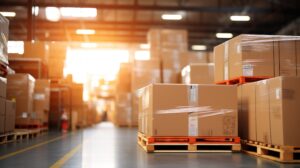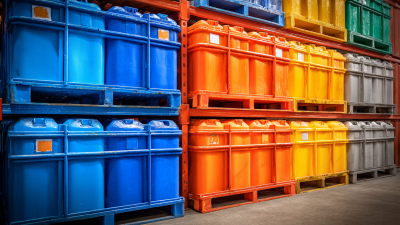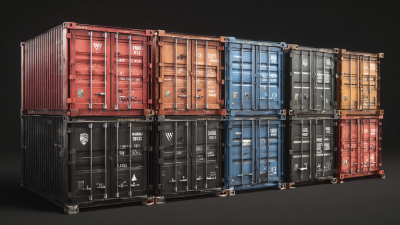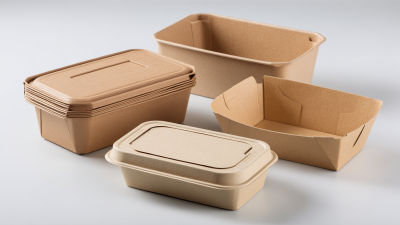
Blog
Navigating Challenges with Plastic Bulk Containers: Common Issues and Solutions for Global Buyers
Navigating the complexities of global procurement can be particularly challenging when it comes to sourcing plastic bulk containers. These essential tools are widely used across various industries for their durability and efficiency in transporting goods.
 However, buyers often encounter common issues ranging from quality concerns to logistical hurdles that can impede their operations. In this blog, we will provide a comprehensive checklist designed specifically for global buyers that outlines key challenges associated with plastic bulk containers and effective solutions to address them.
By understanding these issues and implementing the strategies discussed, businesses can optimize their supply chain, reduce costs, and enhance overall productivity. Join us as we explore the essential aspects of managing plastic bulk containers effectively and ensure a smoother procurement process.
However, buyers often encounter common issues ranging from quality concerns to logistical hurdles that can impede their operations. In this blog, we will provide a comprehensive checklist designed specifically for global buyers that outlines key challenges associated with plastic bulk containers and effective solutions to address them.
By understanding these issues and implementing the strategies discussed, businesses can optimize their supply chain, reduce costs, and enhance overall productivity. Join us as we explore the essential aspects of managing plastic bulk containers effectively and ensure a smoother procurement process.
Understanding the Importance of Quality in Plastic Bulk Containers
When it comes to sourcing plastic bulk containers, the significance of quality cannot be overstated. Global buyers often face a multitude of challenges, from durability to compliance with international safety standards. High-quality containers not only ensure the safe transportation of goods but also enhance operational efficiency. Choosing the right material, such as high-density polyethylene (HDPE) or polypropylene (PP), can impact both the longevity of the container and the safeguarding of its contents. Understanding these specifications helps buyers make informed decisions, reducing the risk of damage and contamination.

Moreover, the importance of quality extends beyond the physical characteristics of the containers. It affects sustainability and environmental considerations as well. Many suppliers are now adopting eco-friendly practices in their manufacturing processes, which resonate with the growing consumer demand for sustainable products. By prioritizing quality, global buyers can align their purchasing decisions with ethical standards and support responsible manufacturing practices. In an increasingly competitive market, these choices can also enhance a brand's reputation, setting them apart in the eyes of environmentally-conscious consumers.
Common Issues Faced by Global Buyers When Sourcing Plastic Containers
In the dynamic landscape of global sourcing, plastic bulk containers play a crucial role in supply chain efficiency. However, buyers often encounter several challenges when procuring these essential items. One common issue is the variability in quality standards across different manufacturers. Buyers may find that plastic containers from various regions do not meet their specific requirements, leading to potential product damage or safety concerns. Conducting thorough quality assessments and establishing clear specifications can mitigate these risks significantly.
Another challenge arises from logistical complexities and shipping concerns. Global buyers must navigate international shipping regulations, which can vary greatly by country. Delays in shipments, tariffs, and customs inspections often lead to increased costs and unreliable delivery schedules. To address this, maintaining open communication with suppliers and leveraging technology for real-time tracking can enhance transparency and efficiency in the supply chain. By proactively managing these issues, global buyers can ensure a smoother and more cost-effective sourcing process for their plastic bulk containers.
Navigating Challenges with Plastic Bulk Containers
Effective Solutions for Enhancing Durability and Performance of Bulk Containers
When it comes to enhancing the durability and performance of plastic bulk containers, global buyers face a myriad of challenges. A recent report by Freedonia Group estimates that the demand for plastic containers is projected to reach 25 billion units by 2026, driven by the growing need for safe and efficient transportation of goods. However, product degradation and container failure remain persistent issues that can undermine supply chain efficiency. To combat these challenges, manufacturers are increasingly turning to advanced materials and innovative designs to boost strength and longevity.

One effective solution is the incorporation of additives like UV inhibitors and impact modifiers. According to the Plastic Industry Association, these enhancements can improve the lifespan of bulk containers by up to 50%, significantly reducing replacement costs and minimizing environmental impact. Additionally, utilizing high-density polyethylene (HDPE) not only offers excellent resistance to chemicals and temperature fluctuations but also enhances structural integrity. Implementing regular maintenance checks and user training on proper handling practices further ensures that these bulk containers perform reliably throughout their lifecycle, thereby providing lasting value to global operations.
Strategies for Overcoming Logistic Challenges in Global Shipping of Plastic Containers
In the rapidly evolving landscape of global shipping, e-commerce has emerged as a driving force reshaping the logistics of plastic bulk containers. With the surge in online shopping, companies face unique challenges related to inventory management and timely distribution. As logistics networks become increasingly stretched, buyers must find innovative ways to streamline shipping processes, such as leveraging automated systems and data analytics to enhance efficiency and transparency.
Moreover, external factors, including geopolitical tensions and fluctuating tariffs, are adding complexity to international trade. Companies engaged in the shipping of plastic containers should adopt adaptive strategies that minimize disruptions. This may include diversifying supply sources and enhancing collaboration with logistics partners, ensuring they remain agile in responding to evolving market demands. Additionally, with more emphasis on sustainability, integrating smart technologies can help in revolutionizing shipping practices, paving a pathway toward a more resilient supply chain.
Navigating Challenges with Plastic Bulk Containers: Common Issues and Solutions for Global Buyers
| Issue | Description | Impact | Solution |
|---|---|---|---|
| Transportation Damage | Containers may be damaged during transit due to poor handling or external factors. | Increased costs due to replacements and delays in supply chain. | Use reinforced packaging and proper loading techniques. |
| Regulatory Compliance | Different countries have varying regulations regarding plastic materials. | Potential fines, delays, or confiscation of materials. | Research and adhere to local regulations before shipping. |
| Supply Chain Disruptions | Unexpected events can halt the movement of goods. | Lost revenue and angry customers. | Implement flexible supply chain strategies including diversifying suppliers. |
| Quality Control Issues | Inconsistent quality from manufacturers can lead to problems. | Product recalls and damage to reputation. | Regular audits and quality checks with suppliers. |
| Cost Fluctuations | Prices for raw materials can vary significantly. | Budgeting difficulties and profit margin pressure. | Negotiate long-term contracts with suppliers to lock in prices. |
Best Practices for Maintaining Compliance with Regulatory Standards in Container Usage
Compliance with regulatory standards is crucial for businesses that use plastic bulk containers, especially in a global context. Different regions have varying regulations regarding material safety, environmental impact, and recycling practices. Understanding these requirements is essential to avoid legal troubles and ensure the safety of the products stored within these containers.
One effective tip for maintaining compliance is to stay updated with the latest regulations pertinent to your market. This can be achieved by subscribing to relevant industry newsletters and attending compliance workshops. Additionally, conduct regular reviews of your suppliers to ensure they meet all necessary standards, particularly if they are located in different countries with different regulations.
Another important practice is to implement a comprehensive training program for employees on regulatory guidelines related to container usage. This includes education on proper handling, storage, and disposal of plastic containers. Encouraging a culture of compliance within your organization not only enhances safety but also leads to better operational efficiency, thereby minimizing the risk of violations and penalties.
Related Posts
-

2025 Trends in Plastic Bulk Containers: A Comprehensive Guide to Innovations and Best Practices
-

Understanding the Technical Specifications of the Best Plastic Shipping Containers with a Comprehensive Tutorial
-

Ultimate Guide to Sourcing Bulk Containers for Your Business Needs
-

Revolutionizing Food Packaging Containers for 2025 The Ultimate Guide to Industry Trends and Innovations
-

Top Strategies for Selecting the Best Plastic Jar for Your Packaging Needs
-

Unlocking Efficiency: The Top Benefits of Plastic Shipping Boxes for Your Business
